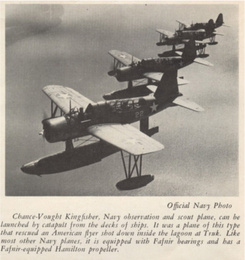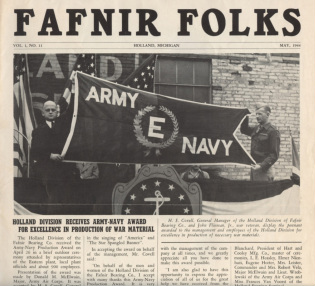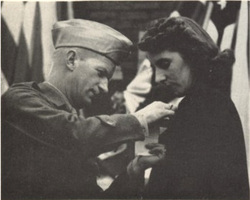

Photo courtesy of the Holland Museum Archives.
One element that made Holland, Michigan nationally important during the war years was the factory, Fafnir Bearing. Located on Lake Macatawa, Fafnir Bearing manufactured ball bearings for airplanes. The company produced thousands of bearings for dozens of types of planes. There were advertisements that showed the same picture shown on the left, with one of the planes inked out, as a warning against missing work, showing each employee that his or her individual effort was necessary to win the war. Fafnir Bearing provided jobs and wages for nearly 1,000 individuals, many of them women; the company also served as a social outlet as women whose sweethearts were gone worked alongside mothers whose sons were fighting in the Pacific. Men who were turned down for service were still able to contribute significantly to the war effort along side other men.

Photo courtesy of the Holland Museum Archives.
Fafnir Bearing was the type of company that was active in the lives of its employees. There was a fishing club for men, a bowling league for women, bridal showers, going away parties, and talent shows. Fafnir also put out a monthly newsletter entitled Fafnir Folks. This publication was quite elaborate and was more than an office-typed update. Issues were typically 7-9 pages long and were printed upon a press. A gossip column called "Among Ourselves" was always present, letters from servicemen and women who had left Fafnir were a constant, and safety warnings were often printed as well. A comic called "Home Front Henry" was scattered throughout the issues and featured a man (Home Front Henry) whose wife worked in a factory. Henry often told other women about how his wife's job was better and/or more important than theirs and complained about how nothing was done around the house anymore, as his wife was working so many hours at the factory for the war effort. "Hints to Housewives" was a column by Harry Keller; slightly degrading in tone, Harry taught women how to skin rabbits, teach their daughters to fish, and make taking care of the home easier. Many of the corespondents for the free-lance articles were female employees.

Photo courtesy of the Holland Museum Archives
Fanna Dokter was working for the Holland company Hart & Cooley when the war broke out and immediately began working at Fafnir Bearing, the first woman to join the company. Fanna married in 1943 while her sweetheart was on furlough, but continued her work at the factory. She worked 8 hours a day, 6 days a week, on a moving shift--sometimes first shift, sometimes second, and sometimes third, with only a day of transition between. A whole span pf age groups worked, Fanna said, and there was always a security guard posted outside of the factory. They were never the victims of an act of sabotage, but the guard was there, just in case.
The Holland division of Fafnir Bearing was so productive, in fact, that they were awarded the Army-Navy Production Award, or the "E" Award. This award was presented by a major in the Army Air Corps., Donald M. McElwain to officials at the plant and approximately 900 employees. The picture to the left is of Fanna Dokter receiving her pin from John Flieman. The ceremony was conducted mainly by men, but because she was the first female employee, Fanna was specifically honored.
The factory shut down almost immediately after the war ended in Europe (VE (or Victory in Europe) Day). The whistle blew in the middle of the day shift, all of the machinery stopped, and production halted. Most of the women got laid off as a result of the drop in demand, as well as the influx of men looking for jobs. Fafnir Bearing is no longer a company; it's building still stands, but now is part of the Heinz Plant.
The Holland division of Fafnir Bearing was so productive, in fact, that they were awarded the Army-Navy Production Award, or the "E" Award. This award was presented by a major in the Army Air Corps., Donald M. McElwain to officials at the plant and approximately 900 employees. The picture to the left is of Fanna Dokter receiving her pin from John Flieman. The ceremony was conducted mainly by men, but because she was the first female employee, Fanna was specifically honored.
The factory shut down almost immediately after the war ended in Europe (VE (or Victory in Europe) Day). The whistle blew in the middle of the day shift, all of the machinery stopped, and production halted. Most of the women got laid off as a result of the drop in demand, as well as the influx of men looking for jobs. Fafnir Bearing is no longer a company; it's building still stands, but now is part of the Heinz Plant.
